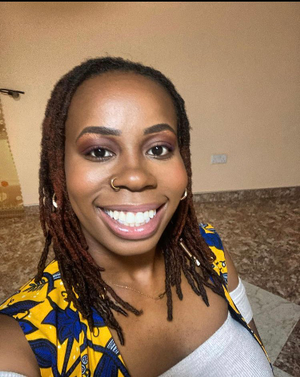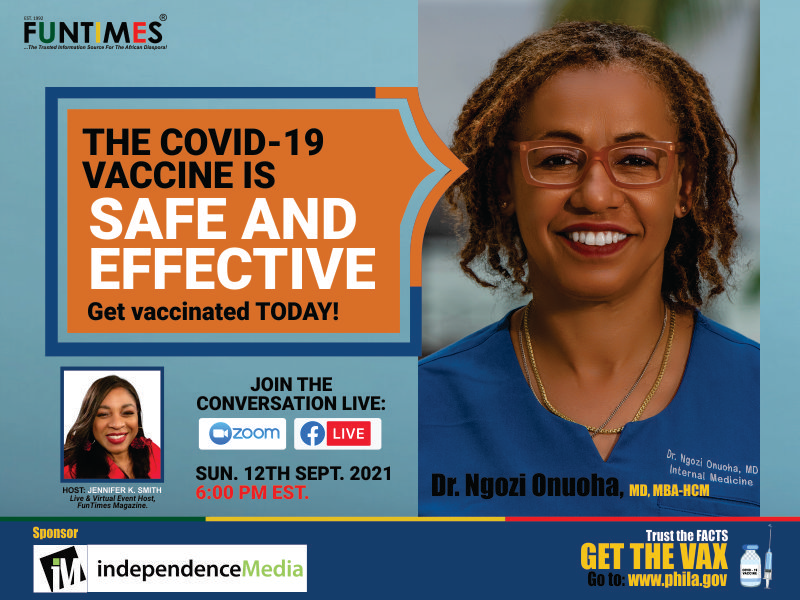On September 12th, 2021, FunTimes Magazine collaborated with the Independence Public Media Foundation and Dr. Ngozi Onuoha, MD MBA-HCM to host a virtual forum to dispel myths about COVID-19 vaccinations.
Dr. Ngozi Onuoha is a Nigerian-born, Philadelphia-based primary care physician who has been educated in Nigeria, the United Kingdom, and the United States. In her “Mitigating Health Hesitancy” presentation, Dr. Onuoha notes that people are hesitant to get COVID-19 vaccinations due to factors like lack of knowledge, mistrust of systems, and fear. To alleviate this, Dr. Onuoha educated communities on the benefits, safety, and efficacy of the COVID-19 vaccine, with the intention to reduce hesitancy and campaign for people to vaccinate.
COVID-19 is an infection that impacts organs, notably the kidneys, lungs, brains, and heart. Although people with underlying conditions like diabetes are more vulnerable to contracting the virus, Dr. Onuoha reminds audience members of the unpredictability of who may contract the virus. She also notes that people who survive COVID-19 may continue to have symptoms such as brain loss or brain fog even after recovering from COVID-19.
Because there is no cure for COVID, vaccines are used to minimize the impacts of COVID-19. Vaccines stimulate the immune system to make antibodies to protect the body against future infections. As of September 21st, 2021, there have been 42,031,103 COVID-19 cases in the US, and 228,394,572 cases globally. In the US, there have been 672,738 COVID-19 deaths and 4,690,186 COVID-19 deaths globally.
The Federal Drug Administration (FDA) approved Pfizer-Biotech (mRNA based) vaccine in August of 2021. The FDA has approved the Moderna (mRNA based) and Johnson & Johnson (flu shot model) vaccines for emergency use.
Dr. Onuoha tells audiences that mRNA vaccines are over 94% effective at preventing symptomatic diseases and 95% effective at preventing hospitalization. Johnson & Johnson’s vaccine is 71% effective at preventing symptomatic infection and 84% effective at preventing hospitalization.
When addressing the question of “How were COVID-19 vaccines developed so quickly?”, Dr. Onuoha says that technologies utilized to develop COVID-19 mRNA vaccines have been used since the 1990s, and notes that mRNA therapy use was catalyzed in Philadelphia at the University of Pennsylvania. There were many research participants used to test the COVID-19 vaccine, since scientists started looking for vaccines right away. This is the first time in history that mRNA is being used as a vaccine.
Side effects of the vaccine include a mild, moderate, or severe case of COVID-19. Researchers have seen mild to moderate cases of COVID-19 even with vaccinated people.
In discussing the importance and need for booster shots, Dr. Onuoha reminds audiences that viruses are constantly changing, and that’s why a lot of these viruses cannot be cured 100%. Dr. Onuoha says “If you got the initial 1 or 2 doses, what is stopping you from getting the booster? If you have come all this way why would you hesitate to get the booster?”.
Although natural remedies will not treat COVID-19, Dr. Onuoha says now more than ever, it is important to eat right, exercise, and have a healthy lifestyle. She notes that people with diabetes end up having the worst outcomes with COVID-19.
Over 5,672,216,779 COVID-19 vaccines have been administered globally, with over 378,050,171 being administered in the USA.
“The sooner we all get vaccinated, the sooner we can get back to normal”, says Dr. Onuoha.
What questions do you have about the COVID-19 vaccine? Comment below!
Works Cited
https://covid.cdc.gov/covid-data-tracker/#datatracker-home
This article has been made possible by the Independence Public Media Foundation.


Nana Ama Addo is a writer, multimedia strategist, film director and storytelling artist. She graduated with a BA in Africana Studies from the College of Wooster, and has studied at the University of Ghana and Kwame Nkrumah University of Science and Technology. Nana Ama tells stories of entrepreneurship and Ghana repatriation at her brand, Asiedua’s Imprint ( www.asieduasimprint.com ).





